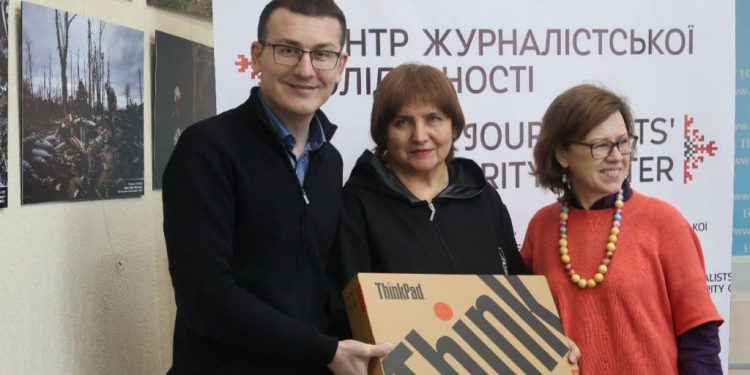Journalist Larysa Salimonovych’s home in northern Saltivka, Kharkiv, now reduced to remnants, stands as a testament to the impact of war. Forced to endure 10 days in the metro without water or food, she faced the challenge of rebuilding her life from scratch, devoid of documents and belongings, following the relentless shelling.
“In Kharkiv, while our area was already experiencing explosions and the impact of war, other parts of the city remained unaware and unaffected.”
February 2022, was special from the very beginning because mass discussions about the war started in Ukraine. People couldn’t wrap their heads around it, but everyone kept discussing and living.
— We thought they were exaggerating, hoping everything would be fine. Then came February 24, a day etched in memory. Early morning, I witnessed explosions near Kharkiv, initially thinking it was a gas explosion. Panic ensued. On Facebook, I asked what was happening, and a colleague revealed Putin had initiated war — begins Larysa Salimonovych’s story.
The journalist quickly and loudly woke up her family to run to the basement. But after sitting there for three hours, they realized that the safest place would be the metro.
— At the same time, in other areas of Kharkiv, no one knew anything about the war, and everything was already exploding for us.
For ten days, the journalist’s family lived in the Kharkiv metro. They didn’t go to the surface at all because the explosions stopped no more than 15-20 minutes at a time.
— In one publication, I think in ‘Ukrainska Pravda,’ I read this: Saltivka suffered the most in Kharkiv, on Saltivka, the most – Northern Saltivka, and there the street Nataliya Uzhviy suffered the most. That’s my street, — says the media personality.
In the metro, Larysa was most surprised by self-organization. There were about 2500 people, but everyone knew exactly what to do, where to go, without interfering with each other. It felt as if people had deliberately prepared to live in wartime. Although, perhaps, over eight years of war in Eastern Ukraine, the people of Kharkiv did learn to self-organize and not panic.
— After all, we have a front-line city. People are used to refugees, military equipment, helicopters, — recalls Larysa the first days of the full-scale war. — And people were surprisingly calm and extremely organized. The next day, a woman appeared – the platform commander who organized literally everything. She gave commands over the loudspeaker.
“We were driving, and on the roadside, there were beaten cars with dead people inside.”
For several days, Larysa looked for a driver willing to take her family out under the barrage of shelling. People were willing to give any amount of money, but few were willing to risk their lives for them.
— We tried to get taxis amid bombings, offering any amount, but no one agreed until a man finally took us. During the drive, we witnessed the horrific aftermath of bombings. We were driving, and on the roadside, there were beaten cars with dead people inside — says Larysa, who at that moment did not know that this would not be the last horror she would have to endure.
— The next horror was the train station. There were so many people! It’s unbelievable! The trains provided for free travel were Soviet trains with wooden benches. And so many people crammed into those trains that it was impossible even to stand, — says the Kharkiv resident with sadness.
 “I found myself in a foreign city, with nowhere to return, but somehow I have to gather myself and continue living...”
“I found myself in a foreign city, with nowhere to return, but somehow I have to gather myself and continue living...”
Enduring the horrors of the journey, Larisa, along with her family, finally reached Vinnytsia, where her brother lives. The first thing that both frightened and reassured them was the silence on the platform of the local train station. Before them was a new city, where they were strangers without belongings and documents.
Here begins a new chapter in the life story of Larysa Salimonovych.
— Our Kharkiv home, part of a large 9-story building, was bombed daily. Living on the sixth floor, our apartment practically vanished as everything from the seventh to the first floor collapsed. — The journalist, tearfully recalling the devastation, couldn’t salvage even photos or documents. That’s the situation. — I found myself in a foreign city, with nowhere to return, but somehow I have to gather myself and continue living…
But the main thing is to learn to accept everything as it is and understand that things can be even worse. With such attitudes, the journalist now lives. She saves herself with work – continuing to work for the publication “Ukraina Moloda” [Young Ukraine].
— I’m very sorry for the photos. It feels like I’ve lost my past. And overall, it feels like over 30 years of life in Kharkiv – it’s as if it were all a dream… But when problems arise, a person loses a lot, but something else comes in its place. The changes that happened to me, if I had stayed in peaceful Kharkiv life, could only have come to me through some illness or something similar. Problems push us towards self-development, — says the journalist confidently.
And Larysa Salimonovych is also saved by her hobby – she is fascinated by numerology. So she has long known that Ukraine will overcome all difficulties – under certain conditions.
— If you analyze Ukraine’s birthdate – August 24, 1991 – and sum the digits, it equals 16. In Tarot, this corresponds to the Tower card, symbolizing our country’s mission. The Tower, representing destruction and renewal, is built with different bricks by Ukrainians. The cyclical nature of our state program includes blows to the tower, such as the first Maidan, then nine years later, the second, and another nine years – the war in 2022. If we draw conclusions, the next trial in nine years will test the tower’s resilience, — concludes Larysa Salimonovych.
This series, titled Shot Freedom of Speech, is created as part of a project Drawing Ukrainian And International Audience’s Attention To Serious Violations Of Human Rights And Crimes Against Journalists And Mass Media By The Russian Federation, which is performed by the National Union of Journalists of Ukraine, with support from the Swedish non-profit organization Civil Rights Defenders.
JOURNALISTS ARE IMPORTANT. Stories of Life and Work in Conditions of War is a cycle of materials prepared by the team of the NUJU with the support of the Swedish human rights organization Civil Rights Defenders.
#CRD

 THE NATIONAL UNION OF
JOURNALISTS OF UKRAINE
THE NATIONAL UNION OF
JOURNALISTS OF UKRAINE
















Discussion about this post